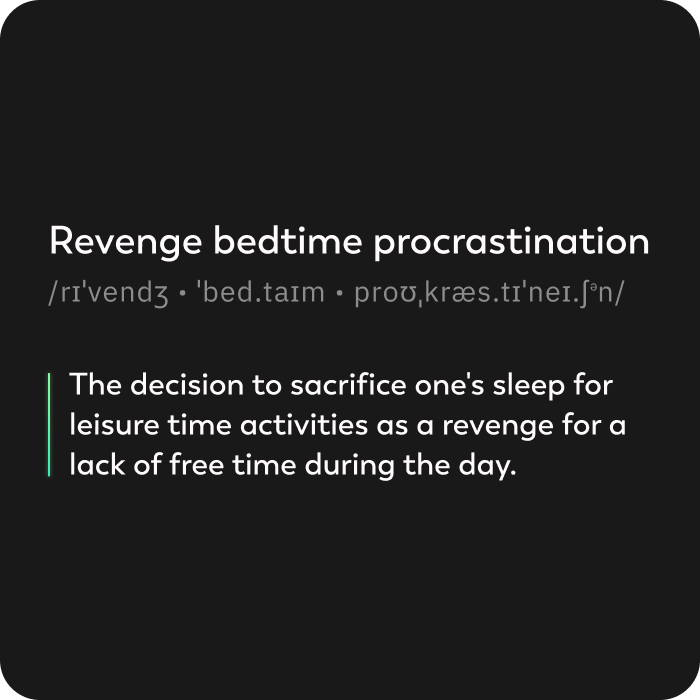3 tips to overcome revenge bedtime procrastination
This article was written by Flow Lab’s Head of Content and MSc. psychologist Eva Siem. She studied at the University of Groningen (NL) and is specialized in the area of performance and motivational psychology. In her articles, she combines findings from psychological research with practical tips from her experience as mental fitness coach and workshop trainer.
If you prefer a video format, feel free to watch our YouTube video here:
Have you ever been on your phone all night to compensate for a really packed day? In a recent Instagram post, we revealed that there’s a name for it: revenge bedtime procrastination. We decide to delay our sleep because we lacked free time during the day and want to compensate for that.
Here’s all you need to know about revenge bedtime procrastination and how to overcome it.

Bedtime procrastination and the importance of sleep
I guess I don’t have to tell you how important sleep is. An endless number of studies shows that sleep deprivation is related to focus and memory problems (Ram et al., 2010) as well as obesity, hypertension and even cardiovascular disease (Buxton & Marcelli, 2010; Sabanayagam & Shankar, 2010). The thing is: In many cases, no external factors (such as sleep disorders) are responsible for our lack of sleep. It’s rather us neglecting to go to bed.
Kroese and colleagues (2014) were the first to introduce bedtime procrastination as the decision to delay sleep without having any external reasons for doing so. They argued that especially at night, people tend to have little mental energy or self-control capacity left (Baumeister, 2002), making it harder to overcome bedtime procrastination. In fact, bedtime procrastinators have been found to use their phone 451% more compared to non-bedtime-procrastinators three hours before bedtime (up to almost 80 minutes; Chung et al., 2020). This can mess up our circadian rhythm and disrupt our deep sleep (Cajochen et al., 2011; Lockley et al., 2003; Wood et al., 2013).
People tend to have less mental energy or self-control strength left at night, explaining why it’s so hard to overcome bedtime procrastination. (Flow Lab) Click To Tweet
Download Flow Lab
Flow Lab is your AI-powered mental fitness app that helps you experience the highly productive Flow State more often. So get your 7-day free trial and train your mind with science-backed guided and personalized meditations: ![]()
![]()
Reasons for revenge bedtime procrastination
Of course being on the phone is an easily accessible and highly stimulating form of entertainment (Brunborg et al., 2011). But we also know that it disrupts our sleep (Twenge et al., 2017) and makes us less productive on the next day (Lanaj et al., 2014). So how come these findings aren’t enough for us to quit bedtime procrastination?
While this line of research is still very young, some researchers have already identified reasons for bedtime procrastination. Nauts and colleagues (2016), for example, observed a bedtime routine aversion among bedtime procrastinators. They simply dislike preparing for bed. You know, these semi-obligatory activities like flossing your teeth, getting changed etc. are just not as fun. Especially when you’re finally enjoying some slack-time after work and perhaps even experience this “end-of-the day” inertia, as Nauts and colleagues (2016) call it. Others highlight a self-regulation failure (Kroese et al., 2014), especially when it comes to media consumption at night (Exelmans & van den Bulck, 2016). We might intend to go to bed early, but the urge to entertain or distract ourselves is too strong. Also negative thoughts and rumination can make us delay our sleep (You et al., 2020).
Alright, so what can we do about it? How can we regulate ourselves and overcome revenge bedtime procrastination?

What research suggests to overcome revenge bedtime procrastination
Apart from consulting a coach who can use, for example, motivational interviewing (Suh et al., 2021), there are a few things that you can try yourself to overcome revenge bedtime procrastination.
Mindfully engage in phone usage
Mindfulness exercises can help to improve your impulse control and to be more aware of your phone usage. Liu et al. (2021) found that mindfully engaging in “cyber leisure” (i.e., being on digital devices for leisure rather than work purposes) can actually have positive effects: People are still able to put their phone away when intending to go to bed, thereby lowering the risk for bedtime procrastination. On top of that, they are more able to use their time on the phone to mentally detach from work. These findings have been shown to increase both vitality on the next day as well as performance. The researchers suggest a short mindfulness breathing exercise before being on the phone in the evening. So if you like, integrate that into your post-work routine (for example with Flow Sessions such as “Calm Winds” or “Grounded”).
A mindful relationship with our phone can reduce bedtime procrastination, help us detach from work and increase performance.
Use mental contrasting with implementation intentions (MCII)
Another powerful strategy to overcome revenge bedtime procrastination is a combination of “mental contrasting” and “implementation intentions” (Valshtein et al., 2019). In mental contrasting, one first visualizes the best possible outcome in as much detail as possible (e.g., with sufficient sleep also feeling well-rested, being in a good mood, being more productive, …). Afterwards, one vividly imagines one’s inner obstacles (e.g., the urge to scroll through Instagram, the impulse to watch videos, …). Becoming aware of this discrepancy is crucial. Only imagining the best outcome or first reflecting on the obstacle before the best outcome has been shown to weaken goal pursuit (Oettingen et al., 2001).
This strategy should then be combined with implementation intentions. These “if-then” plans define which behavior shall be performed when and how and help to automate goal striving (Gollwitzer, 1999, 2014). You may formulate intentions such as “If it is 10pm, then I will stop whatever I’m doing and go to bed”. Or “If it is 10pm, then I will put my phone on flight mode and put it in a different room”.
This combination of mental contrasting and implementation intention is a catch-all strategy – combining goal commitment, striving and implementation (Valshtein et al., 2019). So make sure to give this one a try.

Extra tip: Reflect on your sense of purpose
So far, the scientific literature has only focused on “bedtime procrastination”, leaving out the aspect of “revenge”. This latter aspect emphasizes something else though: It points to the fact that it might not only be a matter of self-regulation failure, but also of intentionally procrastinating on sleep, for example, due to dissatisfaction with how one is spending one’s daytime. Researchers out there, this is your invitation to get started and test interventions specifically tailored to revenge bedtime procrastination.
In the meantime, we can do our best to make our daily lives more meaningful so we don’t feel the urge to procrastinate on sleep in the first place. If you like, take out your journal and reflect on what a perfect, typical day would look like. I mention “typical” here because a typical day may be different from a lazy day in bed for example that we may crave every now and then or perhaps the perfect birthday party or wedding day. 😉
Afterwards, reflect on what it is that makes that typical day perfect: How do you spend your time? What gives you a sense of purpose? What do you derive pleasure from? Which values do you live your life by? This reflection might give you a handle on what you can adapt in your current everyday life to make it more enjoyable and meaningful. Perhaps you’ll also discover daytime activities that you can avoid because they steal your time without adding much value (e.g., unnecessarily often checking your e-mails). If you prefer guided reflections, check out the Flow Sessions “Rocking Chair”, “Legacy” or “Jar of Life” to reflect on the things that give you a sense of purpose.
Start tonight and experiment with these tips to overcome revenge bedtime procrastination and get a good night’s sleep.
